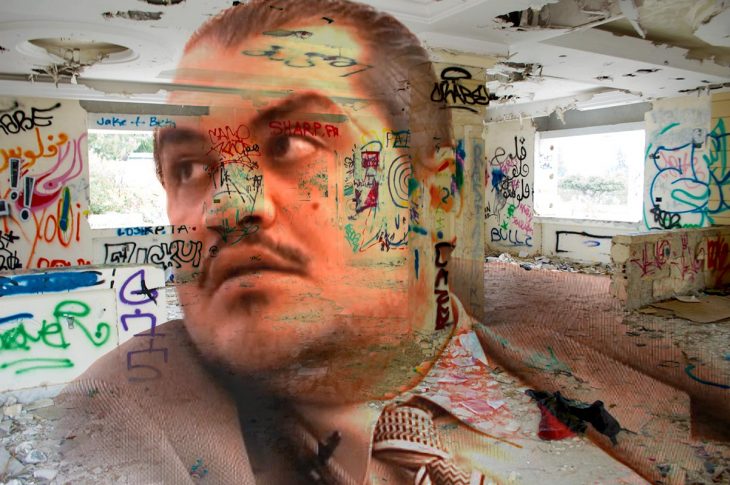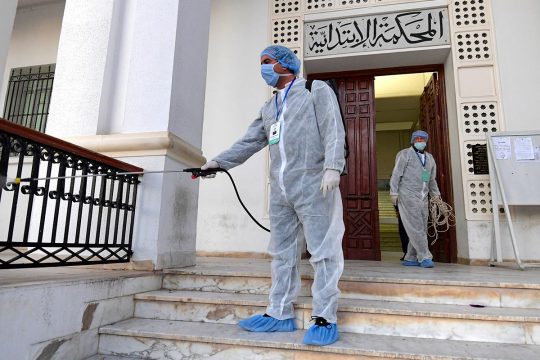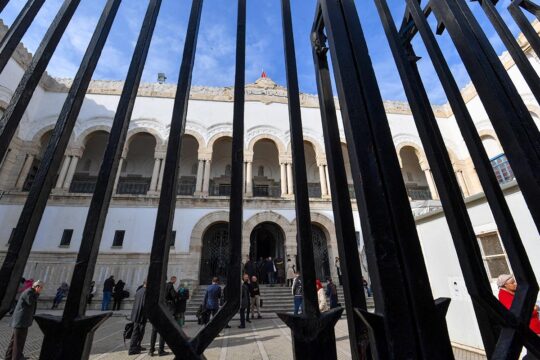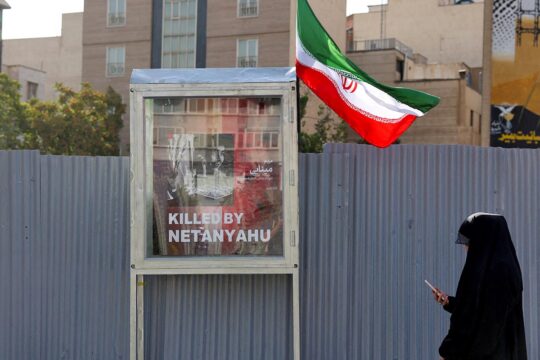Rachida Kouki owes everything to her mother. If Rachida, 36, is now free and married with an eight month old baby, it’s because during the Revolution in early 2011 when Tunisians were demonstrating in the streets, Saida Kouki went around the sit-ins and protests telling people about the injustice inflicted on her daughter.
In January 2011, when President Ben Ali fled the country with his wife and children, Rachida had been languishing in prison for a year and a half, sentenced to life imprisonment. Her mother was afraid that Rachida would be forgotten in those moments of jubilation and political upheaval. During the demonstrations, she kept calling people to tell them about her daughter's tragedy until one day, by chance, she came across a journalist who directed her to the Tunisian Association of Democratic Women (ATFD), a feminist NGO known for its centre supporting victims of violence against women and for its energetic team of women lawyers.
Lawyer Hayet Jazzar, an active member of ATFD, took up the case, visited Rachida in prison, secretly recorded her words and decided to go public. "I never thought that the tyranny of the Trabelsi family could extend even to housemaids," says Jazzar.
“Obey! We are the ruling family!”
On 2 July, before the transitional justice chamber of the Tunis Court of First Instance, Rachida Kouki's former bosses were in the dock: Ines Lajri, her sister, brother and mother. Ines Lajri's husband is none other than Mohamed-Moncef Trabelsi (on the run since 2011), nephew of Leila Trabelsi Ben Ali, the former First Lady known for her numerous siblings and their grasp on the national wealth. Apart from Ali Seriati, director of National Security in the mid-2000s, all the police officers who participated in the alleged abuses against the former housemaid were absent from the hearing.
On 23 January, Rachida Kouki told the court how she had been kidnapped, raped and tortured by her employers, before being unjustly convicted by the justice system of the time and imprisoned. In an interview with Justice Info, she tells her story.
In 2004, Rachida Kouki, a 20 year-old girl who had been doing all kinds of domestic jobs since the age of 14, was working for a member of parliament in Teboursouk, her native region, about 100 kilometres from the Tunisian capital. Thanks to a local shopkeeper with whom she had become friends, Rachida came across a job offer from an agency, looking for a sleep-in housemaid to work in the home of a foreign family. The salary offered was attractive. She applied for the job. But to her surprise, no foreigners came to welcome her. Instead, she was recruited by Latifa Khlass, the mother of Ines Lajri Trabelsi, her future boss. After some time, this lady "gave" her to her daughter, Ines Lajri Trabelsi, who was going through a difficult pregnancy.
"In my remote village in the northwest of the country, we had no idea about the Trabelsis and their abuses. So in the early days, when my boss yelled at me ‘Obey! We are the ruling family!’ I didn't understand anything," recalls Rachida Kouki.
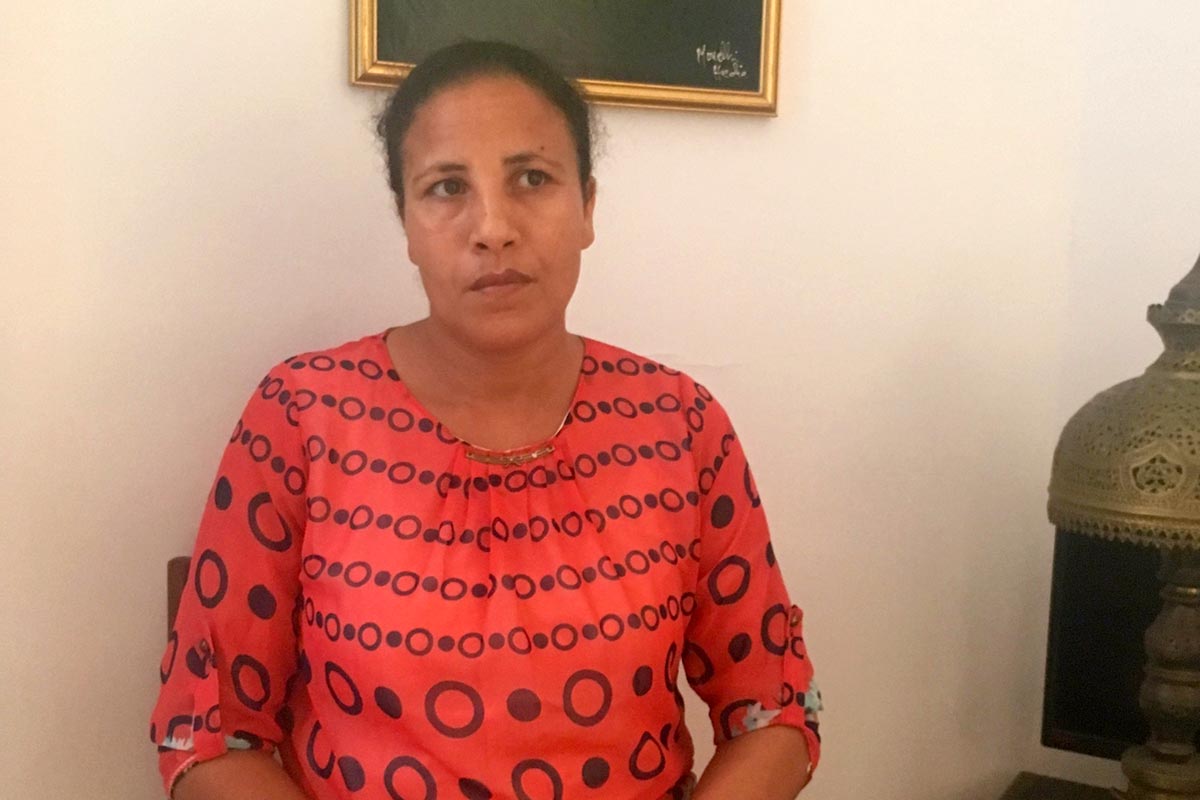
Held captive
The young woman's descent into hell began as soon as Leila Trabelsi Ben Ali's nephew and his wife discovered that their firstborn, Moncef, was autistic. "The mother didn't have time to devote herself to the little one, busy as she was managing the construction site of her new mansion in the Cité les Pins, in La Marsa. I took entire care of him with his grandmother. He became attached to me as if I had given birth to him. A specialist doctor in Paris, whom the [Trabelsi] family consulted, diagnosed the emotional bond between Moncef and me," says Kouki.
It was from that moment, according to Hayet Jazzar, that she was held captive, forbidden to go out or visit her family. The Trabelsi family wanted her night and day at the service of the little boy. Their hold over her was tightened: her mobile phone was confiscated and any communications she was allowed were monitored by the mistress of the house.
"I had no privacy. Body searches were daily and I showered with the door ajar. Those were the orders," says Kouki. Her lawyer adds: "The Trabelsis were obsessed with the idea that the staff in their service would divulge their family secrets and their shady dealings.”
“Jail is better than Trabelsi prison”
Rachida also recounts how she was humiliated and physically and verbally abused each time she complained about the abuse and overwork. Sleeping only four to five hours a night, exhausted by the housework and the care of the little disabled 3-year-old, Rachida tried in 2008 to escape. But two policemen, sent by the Trabelsi family, intercepted her at the bus station on her way to her village. On the orders of the Trabelsis, the victim was punished by the officers: she was beaten, insulted and threatened to be stripped. Taken back to her employers' house, she was violently slapped in front of them by the policemen, who forced her to kiss her mistress's hand.
Rachida Kouki stood up even more vigorously against her oppressors. She was determined to put an end to her "slavery". An idea came to her after an incident, a short circuit in one of the rooms of the house that was quickly fixed by the servants. She then tried to cause another accident in order to be freed from her jailers because, she said, "the women's prison is better than the Trabelsi jail”.
She burned a rug. The fire was quickly put out but she would pay dearly for her desperate act. On 30 April 2009, police officers took Rachida to the Marsa police station, following a complaint from Ines Ajri, who accused her of wanting to set fire to her villa. These two policemen, Nabil Abid and Bilel Beji, tortured her for hours, according to Rachida, by putting her in the “roast chicken” position and beating her with a stick on her feet. She was then forced to sign the report, without even reading its contents.
Life in jail for burning a rug
"I wish the judges of the day had also appeared here to account for their iniquitous and biased judgments under pressure from the government. Let them at least apologize!" protests the lawyer.
Not only was the trial expeditive, but the young woman was also found guilty of the short circuit. She was convicted of "setting fire to a place of residence". Then came the sentence, read out in a classical Arabic that the victim did not understand: life imprisonment. Forbidden to correspond with her family, it would take more than a year for her parents to find out where she was.
When Hayet Jazzar made contact with the victim in early 2012, she was touched by her story. But her appeal was rejected and all legal avenues exhausted. ATFD sought a presidential amnesty. The new head of state, Moncef Marzouki, granted her amnesty on 24 July 2012. But the association did not stop there. It submitted Kouki's case to the Truth and Dignity Commission (IVD), a truth commission set up in the aftermath of the revolution. And it was this commission that, on 14 May 2018, referred the case to the Tunis Chamber of Transitional Justice.
Inès Lajri Trabelsi denies everything
Standing before the judges on 2 July, Ines Lajri denied everything described by Rachida Kouki. "These are reprisals against the Trabelsi family that we are now suffering since the fall of the former regime," she claimed throughout her questioning. "My successive precious pregnancies prevented me from hitting my maid. I had difficulty moving around and didn't have time to take care of girls like her. Rachida is a big liar who must have perfected in prison her art of spinning yarns.”
Rachida Kouki was recognized as a victim by the IVD, which at the end of May 2019 granted her 70% compensation for violations of her physical integrity. Even though she is in need today and her baby, suffering from immune deficiency, requires continuous care, she no longer wants to do other people’s housework. "I would rather live off small farming and my husband's minimum wage than relive a trauma that I still feel!" she exclaims.


